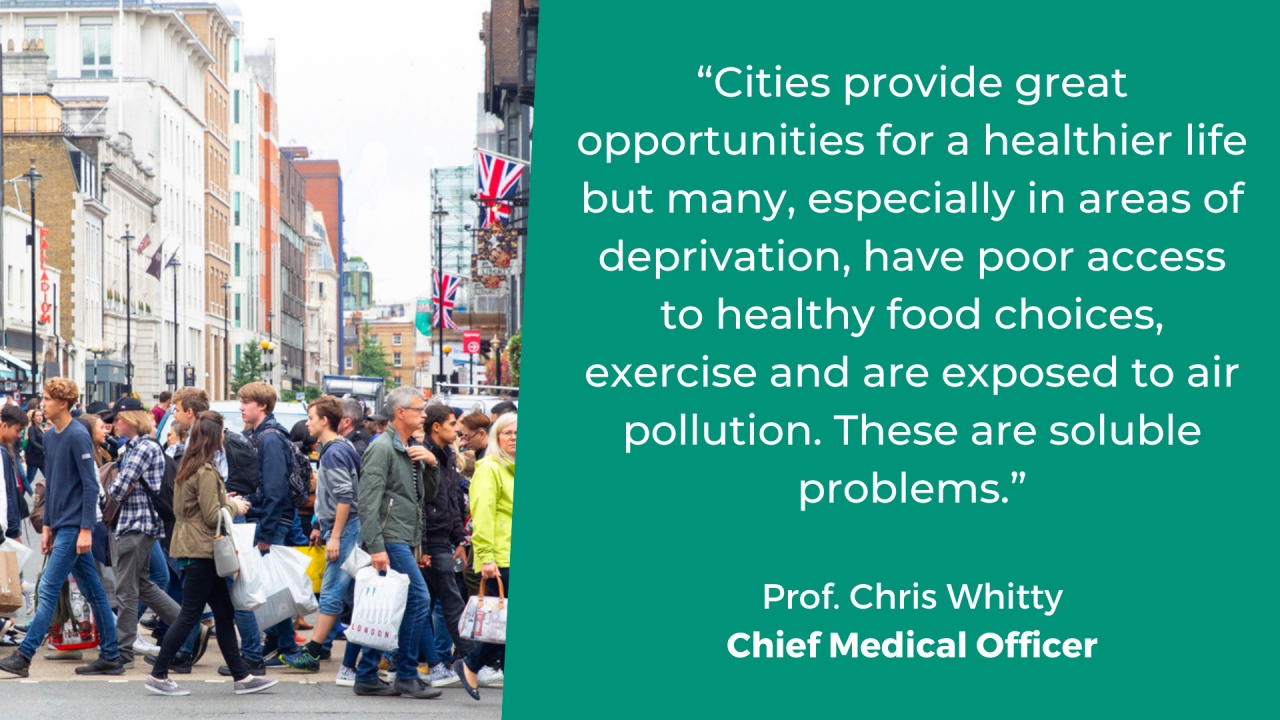The Chief Medical Officer (CMO) for England, Professor Chris Whitty, has released his annual report, focusing on the health opportunities and challenges faced by the diverse populations living in UK cities.
This year's report, titled "Health in Cities," underscores the complex health landscape of urban areas, highlighting both the benefits and the persistent inequalities that affect city dwellers.
The report reveals that areas of entrenched deprivation within cities often have the unhealthiest environments. These areas are characterized by limited access to healthy food options, a higher density of fast food outlets, significant air pollution, and substandard housing conditions. Such factors contribute to ongoing health disparities, with the least deprived populations enjoying good health for significantly longer periods than their more deprived counterparts.
Professor Chris Whitty, Chief Medical Officer, said:
“Cities provide great opportunities for a healthier life but many, especially in areas of deprivation, have poor access to healthy food choices, exercise and are exposed to air pollution. These are soluble problems.
“People move frequently within cities which contain a diversity of population groups - the health system must adapt to them, not the other way around. There are many older citizens living in cities and it is important they are supported to live healthier lives. Addressing the health challenges of cities require a broad range of actions from policymakers, the NHS and individual citizens.”

Despite the presence of numerous specialist healthcare facilities that serve many urban residents, the report indicates that vaccination and screening uptake remains lower in cities compared to other areas. Additionally, cities report higher rates of sexually transmitted infections (STIs). This highlights the need for a more adaptable healthcare system that can better support individuals and improve vaccination and screening rates.
Professor Whitty's report includes several key recommendations aimed at addressing these urban health challenges, particularly for those living in deprived areas. These recommendations focus on mitigating risk factors such as obesity and air pollution, improving the food environment, and enhancing healthcare service planning and delivery. The CMO’s annual reports have been a cornerstone of public health assessment in England for over 150 years, providing an independent evaluation of the nation's health. This year's report continues this tradition, offering critical insights and actionable recommendations to improve health outcomes in cities.
In response to the report, Chairman of the Local Government Association’s Community Wellbeing Board Cllr David Fothergill, commented:
“The places where we grow up, live, and work have a significant impact on our health.
“Cities are home to some of the best and worst health outcomes – often side by side. While they can be vibrant hubs of opportunity, this report highlights the pressing health challenges they face, particularly for our most deprived communities.
“Local government plays a vital role in tackling these issues, from improving air quality and expanding access to green spaces to promoting healthier food environments and tackling homelessness.
“We must ensure that our health systems are flexible and responsive to the unique needs of urban populations, so everyone, regardless of where they live, can enjoy a healthy, fulfilling life.”
For UK health leaders, the findings and recommendations of this report are crucial for shaping future health policies and interventions aimed at reducing health inequalities and enhancing the overall well-being of urban populations.
Image credit: iStock



















